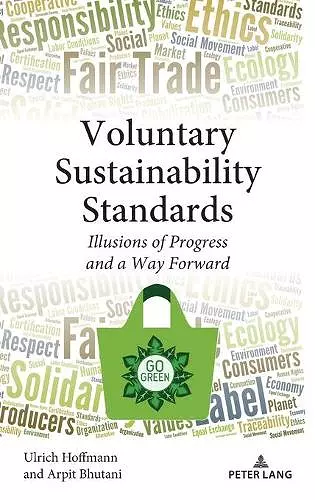Voluntary Sustainability Standards
Illusions of Progress and a Way Forward
Ulrich Hoffmann author Arpit Bhutani author
Format:Hardback
Publisher:Peter Lang Publishing Inc
Published:27th Oct '21
Currently unavailable, and unfortunately no date known when it will be back

Sustainability standards, and in particular voluntary sustainability standards (VSS) have become an integral part of facilitating green consumerism and promoting green economy and green growth. While such standards have undoubtedly led to some desirable change in production structures and methods, as well as in improved material, resource and energy efficiency, overall results have remained modest, mostly incremental and far from leading to transformational, sector- or economy-wide changes. It is therefore high time that after some 30 years of increasing use of sustainability standards one takes stock of their achievements and pros and cons. This analysis should however not be confined to a technical review of the progress in improving or perfectioning the standard system and best practice in standard application and use, but primarily focus on a review of the political economy of VSS and their record in reshaping the current largely unsustainable agro-food economy and the situation of farmers. Many, in particular voluntary sustainability standards are now at a crossroads, but instead of realizing the systemic, deep-rooted nature of the crisis and conceiving of much-required reforms most standard advocates continue to focus their activities on improving the functioning of the standard system and emulating or disseminating best standard-compliance practice. Against this background, the book wonders what the illusions and what the reality of VSS have been in recent decades and whether these standards can be made fit for a future, in which sustainability issues are bound to play an even more important and pressing role. As appendix we looked into the relationship between the Corona crisis as one of the many other epidemics which have hit us hard and the future of globalized supply chains, of which VSS are part of.
“The African food sovereignty movement has been tackling with the restricting impact of markets on the biodiversity of African agriculture for a long time. Reading the book, I was alerted to the importance and ambivalent role of global sustainability standards in global food markets. I learnt how, as a constituent part of the current unjust global agro-food system, Voluntary Sustainability Standards can jeopardize the food sovereignty of our African peasant-based systems and exclude our smallholders from linking to markets.”—Mariam Mayet, Executive Director of the African Centre for Biodiversity, Johannesburg
“The rising dominance of big corporations in Asian food retail and the digitalization of their sales practices increasingly proves that it is detrimental to arresting poverty and hunger. Voluntary sustainability standards (VSS) are part and parcel of these structural changes. They exclude our peasantry from evolving markets, destroy informal activities, such as in food processing and marketing, and impose on us a concept of sustainability that narrowly serves corporate interests. This book unmasks the hypocrisy of the whole exercise, providing much needed insight and analysis.”—Lim Li Ching, Senior Researcher, Third World Network
“Voluntary sustainability standards (VSS) have successfully raised awareness about the huge environmental and social problems embedded in the world’s food systems. This report analyses the inherent limitations of the concept and showcases the ability of big food to use VSS for their PR-campaigns and to exclude small holders from accessing markets. The authors make a convincing case that real sustainability requires inclusive and transparent governance involving all stakeholders. Let us learn the lessons!”—Alexander Müller, Managing Director of TMG—Thinktank; Former State Secretary (German Ministry for Agriculture) and Assistant Director-General of FAO
“It is high time that this book reviews the experience with the use and the real impact of sustainability standards. The merit of this analysis is its focus on the political economy of such standards in international supply chains and their role in transforming the international agro-food production and markets.”—Prof. Ernst von Weizsaecker, Honorary President, The Club of Rome
“The dominant narrative about voluntary sustainability standards is that they have benefited the first movers in the industry by improving their image, but that they have also raised the bar for whole sectors, and successfully compensated for the downward pressure on production methods resulting from global competition. This volume challenges this premature conclusion. It provides robust empirical analysis to illustrate the failures of many such standards. Its great merit is to bring to the fore the issue that most economic analyses neglect entirely: that of power in agrifood chains.”—Olivier De Schutter, Former UN Special Rapporteur on the Right to Food (2008–2014); UN Special Rapporteur on Extreme Poverty and Human Rights
ISBN: 9781433187711
Dimensions: unknown
Weight: 314g
146 pages
New edition